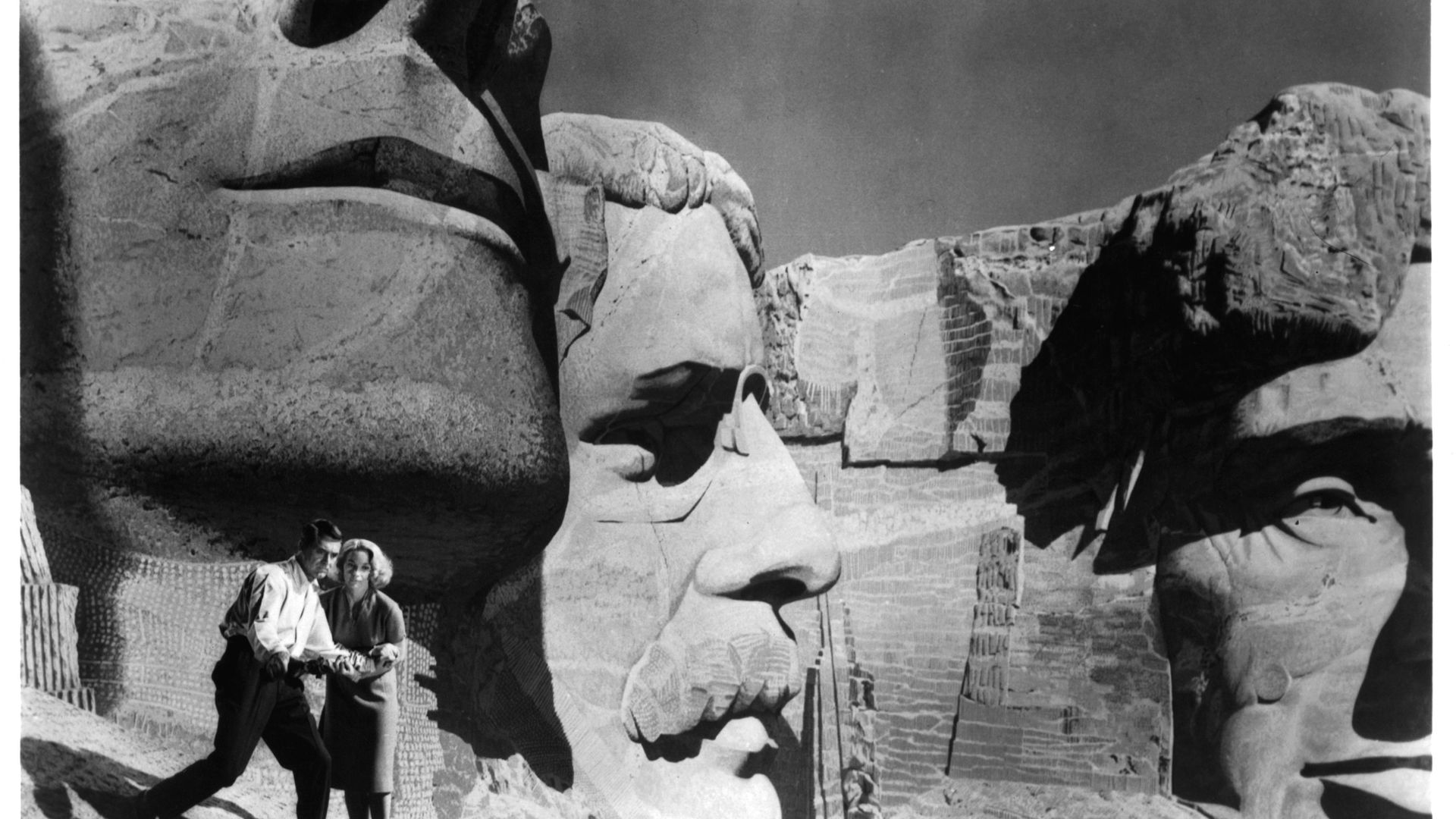
WILL SELF on the unwarranted sense of awe so many Britons have towards US politics.
Towards the end of Alfred Hitchcock’s classic 1959 spy thriller, North by Northwest, the protagonist and his love interest find themselves trapped on Mouth Rushmore by the evil foreign agents. Embodying Madison Avenue advertising executive, Roger Thornhill, with his characteristically blousy insouciance, Cary Grant holds fast to Eve Kendall (played by Eva Marie Saint), who dangles from George Washington’s rocky wig as if she were some sort of human ribbon. Watching the film in the interregnum between the Trump and Biden presidencies, it was difficult not to read the scene as an allegory – but of what?
The giant sculpture of the four presidents’ faces has adorned – or possibly disfigured – the Black Hills of South Dakota since 1941. The First Nations peoples who inhabit the area naturally protested at this humungous act of propagandising terra-forming, and at least managed to divert the stone-carvers from a rock formation – the Needles – that’s yet more sacred to them. However, contemporary campaigns to have a Native American leader incorporated in the sculpture failed to gain traction – as did a Bill in Congress aimed at including the likeness of early feminist campaigner, Susan B Anthony.
Instead, it was decided that the stony visages of four dead white men writ very large indeed would be the greatest crowd-pleaser: for that’s what Mount Rushmore was, is and always will be: a tourist attraction – rather than the ‘Shrine of Democracy’, as its boosters like to refer to it. And watching evil spy, Phillip Vandamm (played by James Mason), pursue his fellow thespians across this strange mountain face made from the faces of Washington, Jefferson, Lincoln and Roosevelt, I thought not of the insignificance of individual lives when set beside the transcendent principles of good governance, but rather of this oddity: both the leading men and the director of this paean to American exceptionalism were all English by birth.
And it’s the British reaction to the ructions in contemporary Washington I thought of as the actors pretended to slip and slide about on the adamantine visages of the ex-presidents. How picayune British journalists and commentators seem when they size up to American events – pathetically in thrall to larger-than-life-size figures, doing exaggerated things. One thing having an American mother and spending a year at an American school did for me, was to vaccinate me against this sort of starry-eyed, gee-whiz attitude to all things Yank – but many of my colleagues seem not to’ve had the jab. How else to explain the way they continue to speak about American politicians in tones of hushed awe, despite the current – and very noisy – crisis that American democracy faces.
In truth, democracy in American has always been something of an oxymoron – as one of its first analysts, Alexis De Tocqueville, understood only too well. A combination of pork-barrel politics and systematic gerrymandering has created a system that can only be described with a radical paraphrasing of Lincoln’s resonant rhetorical figure: this is government by a very few rich people, who certainly are no longer ‘of the people’ in any meaningful sense; and whose actions – by and large – are seldom in the interests of the generality of Americans, let alone the rest of the world’s peoples.
Of course, America has been the global hegemon for a century or so now – and by that fact alone its politics must command our attention. The world’s reserve currency remains the dollar rather than renminbi (which, incidentally, means ‘the people’s currency’); but I can’t help feeling that it’s in the area of cultural rather than social or financial capital that America really continues to hold sway. All the British US correspondents grew up inhabiting a sort of Los Angeles of the mind, as they watched hour-upon-hour of television shot in the city or its stand-ins; they tapped their feet and shook their booties to African-American music – while those feet were clad in sneakers and those booties in Levis.
In the wake of Brexit, the big foreign policy conundrum has been figured as this: cut off from the most proximate main, will Britain now float still closer to the American landmass? The Brexiteers counted on Trump not being a one-term presidential popinjay; but rather, on his becoming – in some strange way – the fifth of those mighty stone idols chiselled from Mount Rushmore. For them, ‘taking back control’ seemed – altogether paradoxically – a matter of ceding still more of it to the US, whether in the realm of food standards or fire-power. Of course the bitterly contested transition to the Biden presidency is a matter of huge significance to us on this side of the pond – yet in the midst of a pandemic that is directly affecting every single Briton, events over there don’t seem to justify quite the level of coverage they’ve received.
Perhaps it’s the common language as much as the co-opted culture, but of all foreign postings Washington seems to be the one that warps British journalists’ objectivity the most: as they paddle up the Potomac in their canoes everything starts to seem on the same huge and bewitching scale as those statuesque quondam commanders-in-chief. Is it any wonder that so many of them – in common with Cary Grant – take native wives, or husbands, and then go native themselves.










